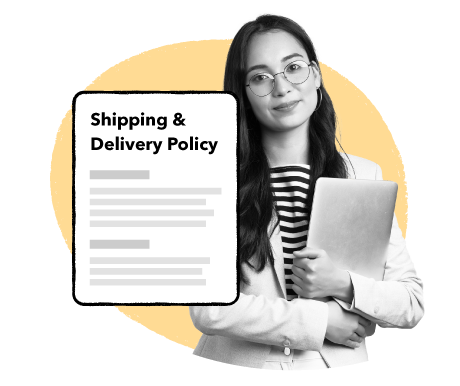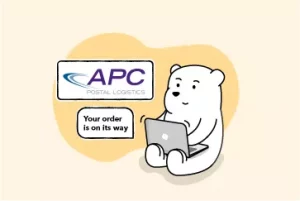
What Does “Out for Delivery” Mean & How Long It Takes?
What does in transit mean and how long does it take? Read this article to find out & see how to answer your customers’ burning questions.
Boost customer experience and reduce support tickets
Realtime order and shipment tracking
Proactive order and shipping notifications
Predictive pre-purchase estimated delivery dates
Self-Serivce branded order tracking
Effortless experience delivered
Make returns profitable and delight customers
Flexibility to define any return destinations & conditions
Simplify returns for your customers and team
Incentivize exchanges over returns
Returns management made easy for your team
Understand why your customers are returning
Unify the online and the in-store experience
Hassle-free pickup experience for customers
In-Store Dashboard to keep operations streamlined
In-Store and Online orders unified
Drive foot-traffic to your stores
Boost customer experience and reduce support tickets
Realtime order and shipment tracking
Proactive order and shipping notifications
Predictive pre-purchase estimated delivery dates
Self-Serivce branded order tracking
Effortless experience delivered
Make returns profitable and delight customers
Flexibility to define any return destinations & conditions
Simplify returns for your customers and team
Incentivize exchanges over returns
Returns management made easy for your team
Understand why your customers are returning
Unify the online and the in-store experience
Hassle-free pickup experience for customers
In-Store Dashboard to keep operations streamlined
In-Store and Online orders unified
Drive foot-traffic to your stores
Find the answer to all your questions
Explore the most comon questions about WeSupply
Calculate the ROI that WeSupply can bring you
Request a no strings attached review of your current shopping experience and missed conversion opportunities
Take a step by step trip through our functionality to see how we can improve your ecommerce processes.
Read actionable articles on how to optimize your post-purchase experience and decrease support tickets
Get inspired by stories of how our customers implemented an effortless post-purchase experience
A Deep Dive into Top Companies' Order Tracking & Returns Strategy
Wondering if WeSupply is a good fit for you? Read through our use cases to see how we can help you increase conversion & improve CX!
What are private label products and how you can use them to kickstart your eCommerce business? Read this article to find out!

Does launching an eCommerce business also mean manufacturing your own goods?
No doubt, launching your eCommerce business can be quite pricey, from sourcing your products to warehousing and transportation.
The good news is that you can outsource production to external manufacturers or wholesale suppliers to save yourself some precious resources, especially when you’re starting out.
There are plenty of options available when it comes to finding the right supplier for your eCommerce business.
You can choose to work with a dropshipper, who will ship products directly to your customers on your behalf. Or, you can source products from a wholesaler or even directly from the manufacturer.
Each option has its own set of pros and cons, so it’s essential to do your research and choose the option that best meets your needs.
For example, working with a supplier as a dropshipper can be a good way to quickly get started without having to invest in inventory upfront.
However, you may have less control over product quality and pricing than if you were to source products directly from the manufacturer, selling private label products.
Ultimately, the decision of whether or not to manufacture your own products will come down to a number of factors, including your budget, business model, and desired level of control over product quality.
Below we’ll break down what it actually means to sell private label products, how to find a reliable private label manufacturer, and what other options are available for your eCommerce business.
The term private label refers to products manufactured and/or packaged for sale by a third-party entity under the name of the retailer selling those particular goods.
Generally speaking, a retailer has already designed their product and they’re looking for manufacturers to develop, produce, and often distribute the final product. The entire process can be summed up this way:
A company comes with the product idea and design.
The third-party manufacturer makes that product.
The manufacturer supplies this product to the retailer.
The retailer sells this product to a consumer under their name.
Although uncommon, the consumer may privately resell the product.
Then what is a private label product?
We’ve put together a comprehensive definition for private label products:
Private label products refer to the goods manufactured by one company but sold under the brand name of another company and that are subject to specific requirements of that brand.
Private label products can be found in a wide range of industries, from food and beverage to cosmetics and cleaning products. Many retailers, including supermarkets and drugstores, offer private label products alongside products from other brands.
A private label brand is a company that creates products for other companies to sell. They do not market or sell any of their own products. They are focused on manufacturing products that are sold to other businesses or consumers by other companies.
Those brands are then responsible for handling all marketing, sales, and post-purchase customer success operations on their end.
Moreover, it’s not uncommon for private label brands to also support kitting, which is the process of packaging-related products in the same box (e.g., bundles). This gives a third party increased flexibility in what kinds of products they sell and in what ways.
As with most things in life, private label goods come with their own perks and disadvantages. What matters is to establish your must-haves and critical requirements and decide what details you afford to overlook in order to settle on a private label product.
Some of the advantages of private label products include having total control over branding, being able to differentiate your product offering, shortening your time-to-market, and having the ability to better forecast inventory needs.
One clear downside is that you may have less negotiating power with suppliers and you might face increased competition from other brands.
In the end, it’s important to do your research and weigh all the factors before deciding whether or not a private label product is right for you, whether you’re trying to cater to a niche market or a huge market.
Private label products have several potential advantages such as adaptability. Private label product manufacturers can more easily adjust their product offerings to meet changing customer demands, whereas eCommerce businesses looking to sell these products have a lot of control over the specifics.
Another advantage of private label products is that eCommerce businesses have some control over pricing, being able to take part in the decision-making process when it comes to raw materials, packaging, and much more.
Finally, merchants can have full control over branding. Wholesale sellers don’t normally have a say in terms of product branding, and can only create a brand identity around their business but not the goods they’re selling.
One of the downsides of private labeling is the dependency on one or more third-party manufacturers. Since they’re in charge of the entire production process, you’ll have to rely on them and their experience. This is why working with a reliable manufacturer is key.
When you own private label products, it sometimes means that only your business can sell those products which, on one hand, it gives you exclusivity. On the other hand, this can be a disadvantage since other stores and wholesalers might not choose to display your products as well.
Moreover, this might lead to poor consumer perception of your brand since private label products often have a reputation for being cheaper, therefore, providing quality on the lower side. Keep in mind that this is not always the case and that there are trustworthy manufacturers out there that create high-quality goods at affordable prices.
Last but not least, poor consumer perception might give you some trouble down the road, especially in terms of building customer loyalty. However, just like with any other product, it can take time to truly take off, particularly when you’re building your brand from scratch.
This means, in fact, that private label products can work perfectly for brands that already have established a name for themselves while nurturing an audience that trusts them.
Although the terms private label and white label are often used interchangeably, there are clear differences between products from each category.
Private label products are also often referred to as Original Equipment Manufacturer goods or OEMs and are generally physical products. White label products can be physical, but it’s often more common to be digital, software products.
In terms of physical goods, private labeling is when a product line is sold exclusively to and through one retailer, whereas white labeling is the process of selling a generic product to multiple merchants, who then brand and price the goods to match their target market.
Moreover, a private label product has to meet the specific requirements of a retailer while a white-label product does not provide the same level of customization and personalization, giving it a more generic look and feel.
Imagine taking an already designed item and simply putting your own brand name on it—that’s a white label product. The good part is that you won’t have to worry about developing the product, producing it, and so on. The not-so-good part is that it implies certain limitations in terms of customization.
On the other hand, when you settle with a manufacturer to produce goods for your business that meet your specific demands, that’s when you’re talking about private label products. The best thing about this is that you get a say in the design and development process, but this often comes at a higher cost.
Another option would be to purchase goods from other brands and resell them, being a “middle-man” in this transaction. This is also known as wholesale or dropshipping, depending on whether you’re managing your own inventory or not.
Dropshipping involves outsourcing inventory management, order fulfillment, shipping, and most often returns to external partners or suppliers, while wholesalers need to take responsibility for most of the logistics (outbound and reverse) themselves.
Here are four different scenarios to help you put each product category in perspective and understand all concepts touched above:
Assuming you’re selling skincare products— a face moisturizer, working with a private label manufacturer means you’re in control of the packaging size, fragrances, and whatever elements you want to customize, and then brand and price the final product.
With white label manufacturers, you’ll get a standardized formula in standard packaging but, in the end, you get to put your brand name and a price on the product.
As a wholesaler, you’re simply selling products from a variety of other brands, and you’re responsible for storing and managing your inventory and order fulfillment process, alongside distribution and reverse logistics.
And last but not least, as a dropshipper, you’ll be selling other people’s private label products without having warehouse and inventory management on your own, and often having suppliers take care of returns on your behalf.
As a business owner, you can choose to sell a combination of all the above— whatever fits your mission, budget, and branding best.
Here are four different scenarios to help you put each product category in perspective and understand all concepts touched above:
Assuming you’re selling skincare products— a face moisturizer, working with a private label manufacturer means you’re in control of the packaging size, fragrances, and whatever elements you want to customize, and then brand and price the final product.
With white label manufacturers, you’ll get a standardized formula in standard packaging but, in the end, you get to put your brand name and a price on the product.
As a wholesaler, you’re simply selling products from a variety of other brands, and you’re responsible for storing and managing your inventory and order fulfillment process, alongside distribution and reverse logistics.
And last but not least, as a dropshipper, you’ll be selling other people’s private label products without having warehouse and inventory management on your own, and often having suppliers take care of returns on your behalf.
As a business owner, you can choose to sell a combination of all the above— whatever fits your mission, budget, and branding best.
If you’re still unsure which option works best for your retail online business, try to look at things this way:
How to make sure private label products are the best choice for your company? It’s simple:
You’ve already designed your own product(s).
Manufacturing the product(s) yourself is a future business goal.
Your product designs are superior to other white label options.
You are a small company waiting to expand your product catalog.
You’ve already established a name for your brand and company.
There are certain situations in which a while label business model is the answer for a merchant, more specifically when:
Entering the market as fast as possible is a priority.
Being an expert in this type of product is not a business goal.
There is no product research and development budget.
White label options already meet your quality standards.

If you’re looking for a way to differentiate your eCommerce business, private label products may be the answer, as opposed to while labeling or wholesale.
Private labeling allows you to put your own unique spin on products and offer it to your customers at a competitive price. There are many benefits to private labeling, including the ability to build a stronger brand identity and differentiate yourself from the competition.
Private label products can also be a great way to boost your profits and increase your profit margins. With careful planning and execution, private label products can be a great way to boost your eCommerce business.
To take your business one step further, make sure you prioritize the post-purchase customer experience with WeSupply! Our platform offers a suite of solutions including pre-sale order delivery prediction, order tracking, post-purchase notifications, and self-service returns.
Check out our demo below to see how we can help your business take off. 🚀
Ready for some post-purchase action?
Book a quick call with our experts to see how WeSupply can help you cut down the number of order-related support tickets!
Learn How To Create Successful Post Purchase Email Campaigns
Build an effective post-purchase email flow that helps you increase customer satisfaction and drive revenue growth!

What does in transit mean and how long does it take? Read this article to find out & see how to answer your customers’ burning questions.

APC Tracking Solution The APC Tracking Solution you need in order to gain back control of your shipments and create a premium post-purchase customer experience.
4 Groundbreaking Retail Trends in 2023 To Reduce Returns & Inquiries Without Losing Customers In Less than 30 Days – Guaranteed. #3 will blow your
All State Express Tracking Solution Take control of your orders and what your customers can see with our All State Express Tracking solution. Sign up
AM Home Delivery & Trucking Tracking Solution AM Home Delivery & Trucking provides online and omnichannel commerce professionals with the highest quality delivery services, whether you’re

Atmos found what they were looking for in WeSupply’s fully customizable tracking page. With our page Atmos goes beyond offering their customers valuable shipping and returns information.